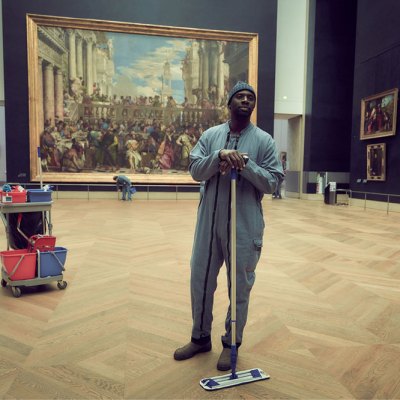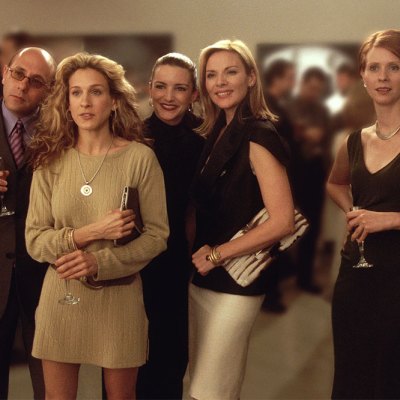Here is a top tip, for if you ever want to trick people into thinking you’re a rich German heiress and then scam them out of thousands of dollars: know a lot about art. This is particularly important if, like Anna Delvey (real name: Sorokin; actual birthplace: Russia), you are borrowing money to realise your vision for a visual arts centre-cum-private club with locations around the world, starting with Manhattan.
In Inventing Anna, the Netflix miniseries that chronicles Delvey’s rise and fall – adapted from a New York Magazine article by Jessica Pressler that went viral on publication in 2018 – the New York art scene is the aspiring mogul’s hunting ground. Played by Julia Garner with a bewitchingly strange pan-European accent, dressed to the nines in designer garb, she wrangles invites to gallery drinks receptions and museum fundraisers, where she sniffs at abstract paintings that aren’t ‘worth a dime’ and pitches her business plan. Delvey wants her club to be filled with sculptures by the likes of Doris Salcedo and claims to have commissioned Christo to wrap the building she plans to lease on 281 Park Ave South. As one of her first targets, the fabulously wealthy collector Talia Mallay, explains when asked how their ‘connection’ formed: ‘I appreciate a woman who doesn’t try to impress […] And she had great taste in art.’
Mallay is one of several fictional characters in the series, filling in the gaps left by the real people who were unnamed in reports. There is also a made-up gallerist called Sasha Thomas, tasked with curating the art collection for the dubiously named Anna Delvey Foundation. The billionaire collector and museum founder Michael Xufu Huang does make an appearance, though his role is minimised. (This is probably for the best – at nine episodes, some running to more than 80 minutes, the series is already too long.)
Perhaps Shonda Rhimes, the show’s creator, wanted to avoid offending specific high-net-worth individuals. In Inventing Anna, not only does Delvey manage to fool a bunch of VIPs, but these VIPs are also portrayed as fools. If an unconnected nobody could use art and clothes and fancy dinners to buy clout amid the moneyed elite, it’s because everyone else was doing the same thing. The art-world parties are a circus of pretentious champagne-guzzlers saying things like, ‘It’s a celebration of garbage as artefact’ and ‘Immateriality in dialogue with transitory spaces’. In general, the dialogue in the series is terrible – loaded to breaking point with exposition and cliché – but during these moments it is almost convincing.
Room with no view: Julia Garner as Anna Sorkin in prison in Inventing Anna. Photo: Aaron Epstein/Netflix
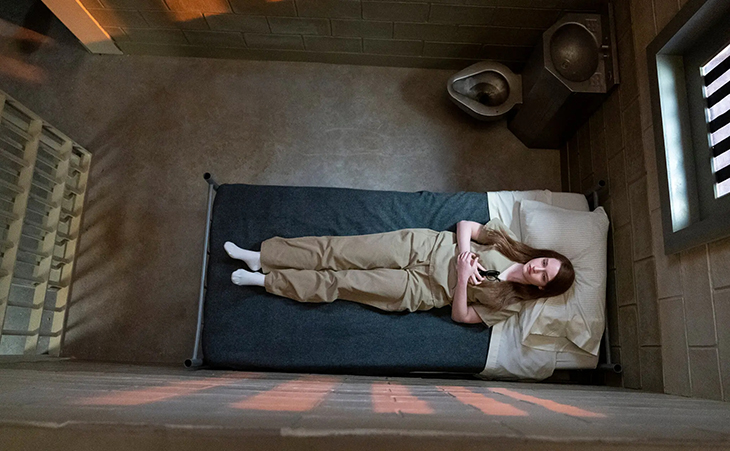
One of the few people to respect the creative process, the series contends, is Delvey herself. Fuming at the camera while having her mugshot taken in the first episode’s opening montage, she proclaims: ‘Anna Delvey’s a masterpiece, bitches.’ In her first encounter with Talia Mallay at an auction-house sale preview, she looks with what appears to be real admiration at a photograph from Cindy Sherman’s Untitled Film Stills, a series from 1977–80 in which the artist posed as various female character types portrayed in Hollywood cinema: the blonde bombshell, the femme fatale, the abused housewife. Like all of Sherman’s self-portraits, these images present identity as something which is constructed – not innate but born out of our desires and projections. Delvey misinterprets the photograph of Sherman as an act of feminist self-reclamation. ‘Before this series, Sherman was just another photographer hiding behind the lens,’ she says. ‘And then one day she steps into her own frame, considers herself to be worthy, rather than being forced into a role in the male-dominated art world. […] This is not dress-up. This is bravery. This is a moment in art.’ The implication is that Delvey’s scam, her consummate self-fashioning as a wealthy entrepreneur, should similarly be appreciated as a ‘moment in art’. Her attention to styling – after a business meeting where she isn’t taken seriously, she undertakes a transformation from platinum-haired socialite in sparkly dresses to brunette in thick-framed Céline glasses – is presented not as ‘dress-up’ but as meticulously considered craft.
Delvey’s con reaches beyond the art world: there is also plenty of schmoozing with tech bros and bankers in five-star hotels. Too much screen time is devoted to storylines involving her lawyer and Pressler’s fictionalised alter ego, a magazine writer called Vivian Kent. But in Inventing Anna each of these interactions explores the same central question: should we admire Delvey for the performance she almost managed to pull off? Is she a grifter who encapsulates everything that is wrong with 21st-century America or was her only mistake still to have faith in the American dream? Kent races against deadlines, both those imposed by her editors and her impending maternity leave, to figure out whether the subject of her profile is a sociopath or a creative genius – or some combination of the two. The mulling of this ethical conundrum gets a little repetitive, although Garner’s mercurial performance – she snaps from cruelty to warmth to sadness, often in a matter of seconds – helps to sustain interest.
Julia Garner as Anna Sorokin with Arian Moayed (right) playing Sorokin’s trial lawyer. Photo: Nicole Rivelli/Netflix
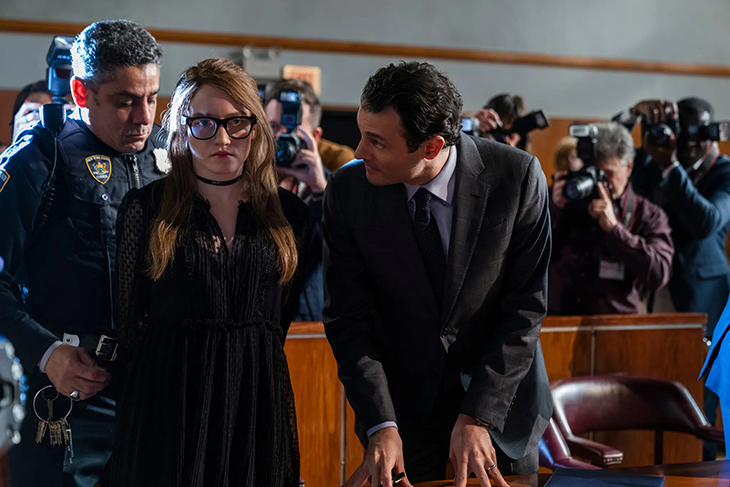
In May 2019, following a jury trial, Delvey was sentenced to four to 12 years in prison for theft- and larceny-related crimes. At the end of the series, a title card informs us that Delvey was released from prison in February 2021 but that she is now back behind bars, detained by US Immigration and Customs Enforcement for overstaying her visa. Her true origins, it is suggested, have betrayed her. What is not mentioned is the $320,000 Delvey received from Netflix to turn her the events that led to her imprisonment into a bingeable TV series – or that she is currently in talks to produce a documentary, write a memoir, and even get in on the NFT game, selling Polaroid selfies and other artworks. She is also still active on Instagram, posting under the handle @theannadelvey. On her feed she recently shared a still featuring Julia Garner from Inventing Anna, accompanied by the caption ‘Inventing me’ (at time of writing the post has 13,776 likes). After spending so long crafting her image, why would Delvey want us to look away now?
The real thing: Anna Sorokin being led away after being sentenced in May 2019 following a conviction for multiple counts of grand larceny and theft of services. Photo: Timothy A. Clary/AFP via Getty Images
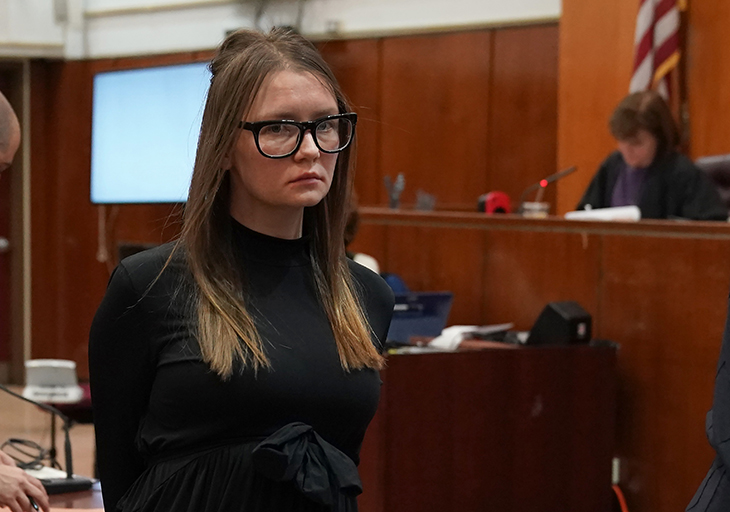
Inventing Anna is streaming on Netflix.


